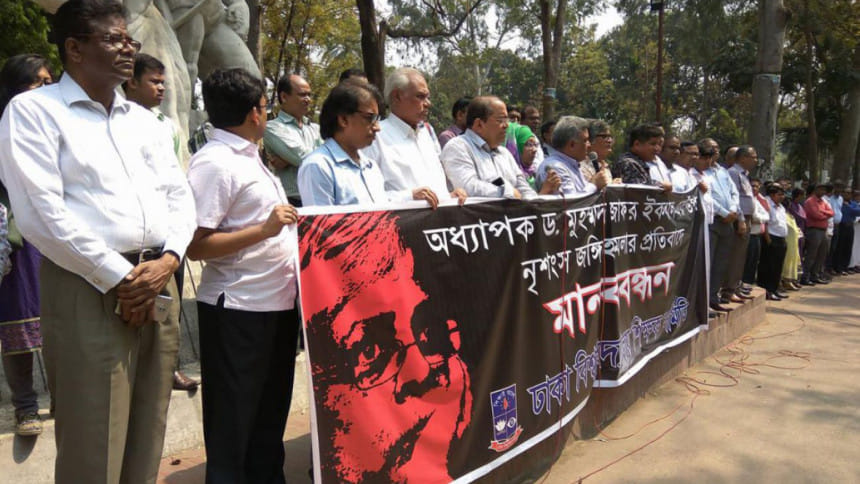A monumental display of moral depravity

Like many millennials who grew up reading Muhammed Zafar Iqbal's coming-of-age novels Hatkata Robin, Dipu Number Two, Amar Bondhu Rashed and his sci-fi books, I was once fascinated by every word that he wrote. Reading him sucked you into a vortex of fantasy, a make-believe world full of colourful characters that kept you on your toes with their bizarre activities. It seemed as real as the first girl you had a crush on, or the first cigarette you had had between stolen glances in the backyard of your school. But the effects of your childhood fantasies begin to wear off as you embrace adulthood.
But Zafar Iqbal was not one to fade into the background noise of our adulthood. For children like us, he was a fascinating writer. But as adults, we also felt his formidable presence as a teacher, an inventor, a promoter of science education, a voice of reason in an otherwise insane sector, a secular commentator, and also a political activist of sort. And like any creative, articulate person of multiple identities, he drew as much adulation as criticism, for he expressed his views openly and without mincing words.
So the first thing that struck me when I got the news of Dr Zafar Iqbal being attacked was the sheer absurdity of it, the notion that someone should try to stop a man from expressing his opinion simply because it contradicted his own. It's a bit like killing a character in a TV drama series because it doesn't fit into the story arc or because it didn't earn positive audience feedback. Only in real life, you don't get to make that call because it's not yours to make.
In a diverse society such as ours, we are more different than alike even though 90 percent of the population belongs to the Islamic faith. Often how we react to a situation depends on what ethnic, linguistic, cultural, social, and—increasingly in recent years—educational background we come from. So it's okay to be different and have a different opinion. It's okay not to be a big fan of someone however popular or powerful. It's okay not to worship, love, respect, or like him. It's even okay that you hate someone and wouldn't like to have anything to do with him. What's not okay—morally, religiously, and legally—is to act on that impulse and harm, or wish harm to, that person in any way physical.
The beauty of diversity is one usually more appreciated by the intellectual class. In her anecdotal biography The Friends of Voltaire (1906), the English writer Evelyn Beatrice Hall beautifully wrote that: "I disapprove of what you say, but I will defend to the death your right to say it" (a quote often misattributed to Voltaire himself). So what I found particularly disturbing about the March 3 incident is that not only did someone choose to act on his feelings of hatred and stab Zafar Iqbal in the head, labelling him an "enemy of Islam," it also found explicit or implicit support from people quite intellectually capable—simply because they didn't like his views.
Some of these people I happen to know personally. It was a disillusioning experience, watching my newsfeed fill with their stream of vitriol and nonsense. From the look of things, it appears a hate campaign is underway to discredit Zafar Iqbal, who is no stranger to such vitriol, partly to counter the overwhelming messages of love and support that he received since the attack. Some of the hate posts that appeared in the media are outrageous; there were also comments that were, quite frankly, unprintable. On the opposite side of the fence, some people who condemned the attack also sought to overextend themselves, providing their opponents with even more ammunition.
Ideally, a sad occasion like this shouldn't have been a time for a battle of ideologies, but here we are, divided into different camps, pursuing our own petty agendas, while the politicians are scuffling among themselves over who was culpable for the attack. Importantly, aside from the fact that the incident has brought religious extremism under renewed scrutiny, it also presented us with an opportunity to reflect over our attitude to diversity.
The fact is, whether you like him or not, there is no denying Dr Zafar Iqbal's enormous contributions in children's literature or science education, for which alone he deserves credit and our sincere gratitude. If you find yourself at variance with him on any issue, just know that there is always room for an alternative viewpoint. And you are perfectly welcome to try yours, using intellectual means, and with the minimum decency expected of an educated person. But using violence and physical force to counter someone is a cowardly act, to say the least, and failing to acknowledge that cowardice is a moral and intellectual depravity of a very dangerous kind. In any case, when you fail to extend moral support to a victim of violence—or an assassination attempt as in the case of Zafar Iqbal—you forfeit your right to ask for the same. It's really that simple.
Contrary to what some people believe, it is our difference of opinion and our openness to it that makes us strong as a society. As someone once said, "Our diversity is our strength. What a dull and pointless life it would be if everyone was the same." Indeed!
Badiuzzaman Bay is a member of the editorial team at The Daily Star.





Comments